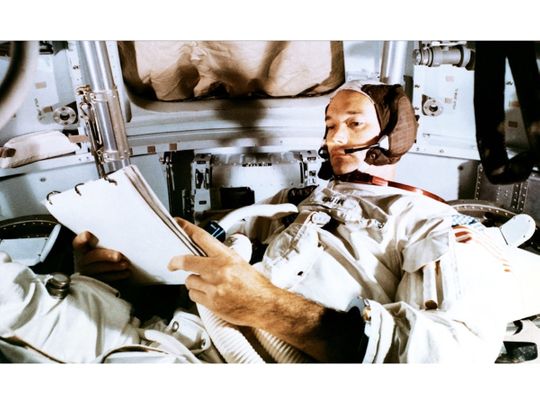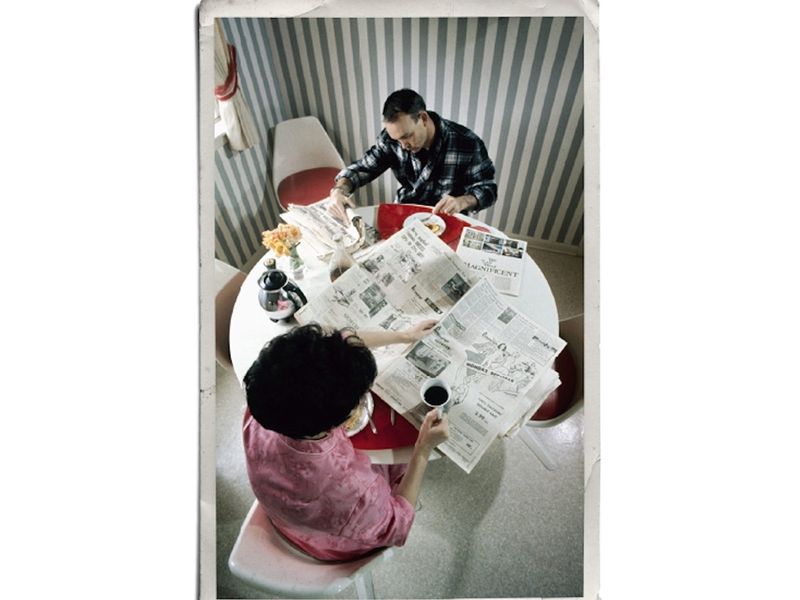
He is the one whose name you never remember. The third man on the Apollo 11 mission, Michael Collins was the pilot of the lunar command module which allowed Neil Armstrong and Buzz Aldrin to walk on the Moon on 20th July 1969. Remaining in or-bit around the Moon, whilst his two companions walked on the satellite, he would experience what no human has experienced since Adam, making him the “most solitary man in the universe”. Aviator Charles Lindbergh who, 40 years previously, crossed the Atlantic alone wrote to him: “I feel closer to you than the other astronauts I saw walk on the Moon”. This limitless experience was recounted by Michael Collins in Carrying the Fire, an autobiography written full of surprising wit and poetry. Coming from a man recruited from amongst the best US fighter pilots, you would have imagined it to be much more factual and methodical.
Born in Rome in 1930, he served in France, at the Chambley-Bussières NATO base in Alsace in the 50s. It was in this village that he married on two occasions to the same woman. But, it is not his honeymoon which interests us here.
A GIANT RABBIT UNDER A LEMON TREE
On 16th July 1969 at Houston space center, Michael Collins woke up at 4am for a lift-off at 08:32 hours. A seemingly meaningless time which could be the same as that of a long-haul flight or suburban train. After showering and shaving, again nothing out of the ordinary, it was time for breakfast. Paul Calle, an artist employed by NASA, sketched him during his final feast. He then got ready. Agitation and caco phony were all around. But once he tightened his fish-bowl shaped helmet around his head, aside for the oxygen being fed into his space suit, not a sound. Total silence reigned. Photo session, and then boarding. What must he have been thinking at this precise moment? He stated in his memories: “Here I was, a white man, 38 years old, 1m80, 74.8 kg, 17,000 dollars per year, living in Texas in a suburban home with an ill rose tree, about to be launched towards the Moon. Yes, the Moon”.
When the module separated from the umbilical on the launch tower, the astronaut did not feel the speed. During the entire flight, the crew would have to be cautious not to be impressed by the awe-inspiring view outside the window, and remain concentrated on the many check-lists. However, nothing would prevent Michael Collins from remembering the question that his five year old son had asked him before taking off on his maiden space flight: “But who is the driver?” From a fearless pioneer of the sky, on behalf of the most powerful nation on Earth, enrolled on the “greatest adventure in the history of mankind” aboard a vessel propelled at breath-taking speed towards the Moon, the answer you might expect would have been something like, It is your father son, that is my mission. But no! To our great joy, our superhero in orbit preferred to say this striking remark: “Isaac Newton”.
When back on Earth, he revealed his secrets as an astronaut: “Like a chicken on a motorised spit, do not stay too close to the sun nor too far as to freeze”. Concerning their base at the NASA space center in Houston, Michael Collins tells us they would dictate to them every day streams of information. A surreal moment when his two companions were preparing to leave Michael Collins alone to walk on the Moon, a correspondent told him that according to a Chinese legend, the satellite which is lit up at night in our sky is home to a rabbit living beneath a lemon tree. With this bizarre image in his mind, Collins informed them: “Hey guys, take care!” Neil Armstrong gave the most simple answer possible: “See you later”. Both men took off, and Collins sent out a final desperate message: “Keep talking to me guys”, which seemed to be lost in the galactic obscurity. The most epic moment in his existence then began. This “moment of greater depth than for those who walked on the Moon”, according to Lindbergh.
HIS SECRET TERROR
With a billion viewers in the world, Michael Collins would be one of the few Americans not to follow the event live. Deprived of radio transmissions due to the position of the Moon, he would be entirely unaware of what was happening for 48 minutes. At 3,200 km from the two astronauts, and over 350,000 km from the rest of the population of the Earth, he noted in his journal that this feeling of representing life all alone was very nice. But some years later, he would also reveal his “secret terror” of returning to Earth by himself if all failed. He would then be a man who was marked for life. A legitimate anxiety since we would learn that President Nixon had prepared two speeches, including this: “Destiny decided that the men who travelled to the Moon to explore it in peace would rest there in peace. These courageous men, Neil Armstrong and Edwin Aldrin also know that there is no hope of finding them. But they are also aware of the hope for humanity in their sacrifice”.
The call from Houston which announced the return of his companions relieved him immeasurably. Whilst the congratulation messages began to come from heads of state across the world, the three men resumed with the end-less check-lists. Then occurred this stupefying moment where Collins frenetically sought out a bottle of Chambertin!

The three men would then begin a triumphant tour in 25 countries to meet the Pope, the Queen of England, the Emperor of Japan, the Shah of Iran, and Franco. Just as his two comrades, Michael Collins would also have his star on Hollywood Boulevard. We could understand him to be somewhat bitter about this incomplete experience. However, this was not the case. “I would lie or be stupid if I said that I had the best of the three seats on Apollo 11, but I can say in total equanimity that I am perfectly satisfied with what I achieved”. He even goes on to add: “Write ‘Lucky’ on my tombstone”. A small crater located close to the landing site of Apollo 11, an asteroid and a racing horse owned by Nelson Rockefeller would be named after him. Very little compared to the planetary hysteria which would form around his two col-leagues. A return to Earth which was more akin to a descent into hell. Depression, alcoholism, divorce and periods in a psychiatric hospital would follow for Buzz Aldrin who took 15 years to recover. Neil Armstrong would take his hair-dresser to court for selling his hair to collectors for 3,000 dollars. He could trade each of his appearances for a million dollars, but refused interviews and went into virtual solitude.
“FRIENDLY STRANGERS”
Contrary to the crews of other missions, the three members of Apollo 11 would remain “friendly strangers” to one another, as stated by Collins. It should be reiterated that aboard the module, they did not exchange any personal details, only technical information. You could believe that such an experience would bond you for life. But, they rarely called each other and would see each other even less. Whilst Michael Collins was not famous enough for cheques which he signed to not be cashed, he would never theless be famous enough to respond to the same questions for the rest of his life. He recognised that on return to Earth, he had become much more demanding in his choice of holiday destinations. He chose to abandon his career as an astronaut, forever giving up on the possibility of exploring the Moon’s surface, in a subsequent Apollo mission. Contrary to planet Mars, he didn’t believe the Moon to be a “particularly interesting place”. The end of his career was spent at the National Air and Space Museum in Washington, of which he was the director. He was the only one of the three to have kept the same wife. His pleasures: fishing, water colour painting, reading, cooking, the stock markets and the joy of opening a fi ne bottle of Cabernet at less than 10 dollars.


